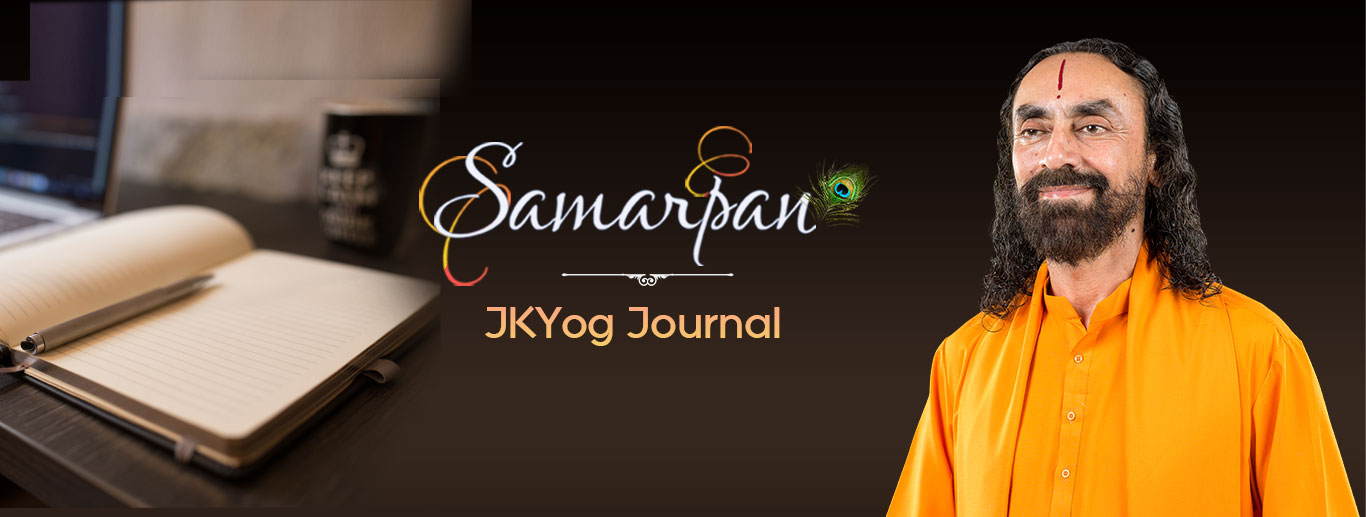
From the Editor’s Desk
We have all heard stories or witnessed the immense ability of saints to tolerate inappropriate thoughts and actions of mayadheen souls (i.e., those under the control of God’s material energy Maya). While Maya can be conquered only through divine grace, we can make the effort to learn traits that are essential on the spiritual path. In previous issues, we learned about forgiveness, humility and detachment. In this issue, we focus on practicing tolerance as taught by Swami Mukundananda.

Vedic Wisdom & Application
Challenge of the Month
Practicing Tolerance
Reflection Questions
- What does it mean to Practice Tolerance?
- What are the Benefits of Practicing Tolerance?
- How can we Practice Tolerance for Success in Life?
What does it mean to Practice Tolerance?
Practicing tolerance means to accept differences in beliefs, perspectives and attitudes of others even if they may be controversial or distasteful. It is the ability or the willingness to put up with something that we dislike or even despise. For example, withstanding the annoyance of a driver cutting off dangerously to grab the only vacant parking spot, enduring insults from others, enduring someone’s self-aggrandizement, or bearing the pangs of hunger. Practicing tolerance implies withstanding some amount of hardship that the mind or body would prefer to but should not avoid.
Tolerance is not the same indulgence. For example, a parent observes a child misbehaving but refrains from correcting him due to her attachment to the child. Tolerance is also not the same as having a weak will and thus avoiding confrontation due to fear. Tolerance is not indifference either, where a person does not care one way or the other about wrongdoing as long as s/he is not held responsible for the action.
Tolerating discomfort, pain or embarrassment is very difficult because all material souls are under the influence of Maya, God’s material energy. The presence of Maya is evident through the three modes or gunas namely, Sattva (goodness), Rajas (passion), and Tamas (ignorance). When different people are under the influence of different gunas, they may not have the same capacity for tolerating hardship. The test of tolerance is when a person can remain equipoised even in adverse situations as exemplified by saints who are gunatit (i.e., free from material nature or transcendental).
A very well-known story of Muktabai illustrates this point. Muktabai was a young girl who lived with her three older brothers, Nivrutti, Jnaneshwar, and Sopan in a village called Alandi, near Pune, Maharashtra. Their parents had passed away. During Diwali, Muktabai wanted to make puranpolis (sweet stuffed chappatis) for her brothers, for which she needed a clay flat pan. She decided to go to a local shop to purchase one.
As Muktabai walked through the streets, people looked at her and smiled, recognizing her inner divinity. A Brahmin priest, Visoba Chati, did not like her nor her brothers. He saw her and asked why she was running around in the village by herself. Muktabai told him of her desire to buy a clay pan to make puranpolis for her brothers. Visoba got to the shop first and coerced the shopkeeper to not sell the clay pan to Muktabai. The young girl was very disheartened and knew that Visoba had orchestrated the move. She returned home and told her brother Jnaneshwar about how the shopkeeper refused to sell her the pan out of fear of Visoba’s mayic powers. By this time, Visoba who had quietly followed Muktabai to see how things would unravel at their house, heard the conversation between the two siblings who were also aware of Visoba’s presence.
Jnaneshwar told Muktabai to not worry about how to bake the puranpolis. He said that she could roast them on his back. Jnaneshwar knelt on his arms and knees with a flat back. With his yogic siddhis, Jnaneshwar’s back turned red hot and Muktabai made the puranpolis for her brothers. Visoba was transfixed as he watched the divine miracle and realized his own prejudice. Muktabai invited Visoba inside to eat the puranpolis. When he came inside, Visoba begged the 13-year old Jnaneshwar to become his Guru. Jnaneshwar smiled and told him that his little sister, Muktabai would accept him as her disciple. Visoba felt affronted at the thought of a little girl being his Guru. However, when he looked at her, he noticed for the first time, the divinity in her face and his heart was filled with devotion.
Another common story is how Nityananda Prabhu tolerated the pain from a serious injury caused by the evil Madhai who had thrown an earthen pot on his head, making it bleed. When Chaitanya Mahaprabhu found out what had happened, He was about to kill Madhai and his equally evil brother Jagai but stopped because Nityananda Prabhu begged Him to forgive the wrongdoings of the two brothers. Subsequently, the brothers repented and became Mahaprabhu’s disciples. Similarly, Saint Eknath took a bath in the Narmada river countless times to purify his body when a man kept spitting on him each time he came out of the water. Instead of cursing the man, Saint Eknath thanked him for numerous opportunities to bathe in the sacred river.
These stories illustrate how saints practice tolerance. Although we ordinary souls are filled with material gunas that fluctuate on a minute-by-minute basis, we can definitely make the effort to learn to practice tolerance, one step at a time.
Jagadguru Shree Kripaluji Maharaj stated a line, “Vṛiksha se barha kara sahiṣhnu, bhava bhi ho pyare” in a beautiful kirtan, Sadhana Karu Pyare. It means that as devotees on the spiritual path, we must be more tolerant than a tree. A famous verse by Chaitanya Mahaprabhu beautifully captures the sentiment that Shree Maharajji has taught:
तृणादपि सुनीचेन, तरोरपि सहिष्णुना ।
अमानिना मानदेन, कीर्तनीय सदा हरिः ॥
Trinaadapi sunichena, Tarorapi sahishnuna
Amaanina maanadena, Kirtaniya sada Harih
Be Humbler than a blade of grass, and more tolerant and forgiving than a tree. Give respect to others, but do not desire respect in return. While living like this, always chant and remember Shree Krishna.
What are the Benefits of Practicing Tolerance?
While there are many benefits of practicing tolerance, a few of them are noted here.
- Positive effect on one’s well-being. The ability to practice tolerance allows us to be more broadminded and worry less about differences. Additionally, it also increases our inner strength from knowing that we can accept diversity in thoughts, perspectives and actions. Knowing that we are making attempts to implement our Guru’s teachings, can boost the inner self and increase the sense of well-being.
- Effective teamwork in any environment. Teamwork is about an open exchange of ideas, peaceful coexistence, and harmony from acceptance rather than forced tolerance to avoid a conflict. Such an attitude enhances relationships in the long run.
- Reduced stress from not accepting insults. When others insult us, we will experience stress only if we “accept” the gibes or insults. By remaining unaffected, the insults remain with the person who delivers it. This point is illustrated in a story of Buddha narrated by Swamiji in some of his lectures. A man was yelling at Buddha who kept calmly listening to his vitriolic. When the man stopped, Buddha asked his disciples to give him food and water since he was exhausted. The man’s temperament changed seeing Buddha's calm demeanor. He asked Buddha how He stayed so calm. Buddha replied that he did not accept any of the insults, so they remained with the man himself.
- Success in all spheres of life. It is extremely rare to find people who agree with us at all times. Practicing tolerance allows us to learn patience and perceive things from another person’s perspective. Both qualities are endearing to people, leading to success in life.
- Attract divine grace. God is perfect and He wants all material souls to strive toward perfection. When we practice tolerance, it indicates our intent to persevere, learn discrimination skills (i.e., vivek) and not let egoistic tendencies take over. Such efforts attract divine grace from God and Guru. Swamiji says that we must “Take discomfort as a spiritual test.”
How can we Practice Tolerance for Success in Life?
- Expect Material Souls to Misbehave. When we understand that materials souls tend to behave in ways that anger or distress us, we can start by not expecting them to behave in ways that please us. If we react to each and every gibe or insult, it will adversely affect the quality of our own mind. To practice tolerance, when in the company of people whose behavior is bothersome, tell yourself, “I know s/he will do or say something to push my buttons. I will not react and remember that God wants me to be tolerant.”
- Assess Your Inner State. Identify (a) exactly what bothers you about different people, (b) how it makes you feel, and (c) the true source of annoyance (e.g., ego, attachment to your own thoughts, something else). Determine whether the triggers of anger or distress are related to you losing access to something preferred or having to deal with something non-preferred. Knowing your own self will help you to strategize a plan for action.
- Evaluate Your Interactions with Others. It is important to assess how others dealt with you when you were annoying or disagreeable. If they showed patience and tolerance of your misbehavior, then you may want to develop these traits yourself with the aim to attract divine grace.
- Engage in Meditation. Create your own meditation script to help you remember the purpose of your life and how disagreeable situations or people teach you mental austerities that come with practicing tolerance. During contemplation, remind yourself that in the final analysis, success or failure in life is determined by the extent to which we purify the heart.
- Treat the Critics with Respect. Swamiji teaches us to practice tolerance by listening to criticism from others with acceptance. This is the way to purify the heart wherein there is a reason to be annoyed but you choose to tolerate discomfort; there is a reason to be attached to your beliefs, to feel pride, to experience envy or hatred but you choose the opposite because the goal is to purify the inner self. Tell yourself, “My goal is to purify my soul. If others praise me all the time, it will boost my ego but not teach me humility or tolerance. Adverse circumstances will help to purify my heart.”
Our hearts are rough and unfinished because of endless lifetimes of attachment in the world. If we wish to become internally beautiful, we must be willing to tolerate pain and let the world do its job of purifying us (Bhagavad Gita 5.3). Remember this beautiful message from the Bhagavad Gita when in a stressful situation.

Tools for Your Personal Growth
Tolerating discomfort one step at a time, will gradually lead to mastery. When people insult us, we may practice tolerating the pain of humiliation. This will teach us to be humble if we bear the pain of a hurt ego. Swamiji says that we must learn to forego the immediate pleasure of reacting in anger by saying something vengeful.
How tolerant are you of other people’s actions, beliefs and attitudes? Assess your tolerance level to know. A downloadable tracking sheet available for you to use.

How tolerant are you of other people’s actions, beliefs and attitudes? Assess your tolerance level to know.

Love to Hear from You
- How did you apply the Vedic Wisdom?
- What challenges did you experience in the process?
Please share your comments under “Join the Discussion” below.

Gems of Wisdom from Swamiji
Here are some YouTube video titles with related links and one sessions from SMEx are shared with you. In these video lectures, Swamiji describes the importance of practicing tolerance in adverse circumstances.
- The Most Powerful Way to Deal with Insults and Negative People
- SMExclusive Live Session 1 | Feb. 13, 2021. If you are a member of the SMEx community, listen to Swamiji’s lecture on Tolerating Discomfort. Swamiji beautifully explains that we all want comfort, but internal growth begins at the end of our comfort zone. We tend to run away from discomfort which in reality is very beneficial for us.



Hold Your Breath! Check out Upcoming Events
We are very excited to share with you, two dynamite events that everyone is looking forward to this month!

International Women’s Day
In the 21st century, we still live in a world filled with gender bias again women regardless of their memorable accomplishments. JKYog respects all women by honoring the most exemplary women by recognizing their exceptional achievements at a global level on March 8, 2022 – the 111th Anniversary of the International Women’s Day. This year’s Distinguished Speakers include Dr. Padmini Murthy and Prof. Rohini M. Godbole.
Dr. Murthy is a Professor and Global Health Director at the New York Medical College School of Health Sciences and Practice, USA. During the COVID crisis in 2020-21, Dr. Murthy spearheaded efforts to work with other NGOs and foundations to send oxygen concentrators and masks, face shields etc. to the ones in most need. She has received numerous awards for excellence in her field.
Prof. Rohini M. Godbole is a theoretical particle physicist and an Honorary Professor at the Indian Institute of Science, Bangalore. She retired from the Centre for High-Energy Physics after serving as Professor for over 25 years. Her research on exploring the Standard Model of particle physics and physics beyond the standard model, has resulted in over 300 publications in refereed journals.
Read more about both distinguished speakers on our website.

Dallas & Houston Holifest
The highly awaited festival of colors is only a couple of weeks away! JKYog’s grand Holifest celebration at the Radha Krishna Temple in Allen from March 17-19, and in Houston on March 20th, will be filled with many exciting events including color play, carnival rides, delicious food, and singing-dancing with Bollywood stars Harry Anand and Shalmali Kholgade. This is a mega charity event to support JKYog’s numerous causes.
There will be opportunities to make personal connections with the superstars at the Meet-and-Greet Dinner and to dance and sing with them up-close to the stage as they perform. Do not miss the Satyanarayan Katha and Holika Dahan at the Radha Krishna Temple on March 17th.
Remember to purchase tickets in advance to participate in each or all the different events. There are many different ticket options, and you can pick the one that works best for you.
- General Admission: For only $15.00, you can have unlimited fun as you dance and sing along to the non-stop music by Harry Anand and Shalmali Kholgade.
- Deluxe Admission: For only $50.00, you get at enjoy all the activities noted above but up close and personal to performers on the stage with a designated seating area for ultimate fun and convenience!
- Premium Admission: For $250.00, you can have private table seating for one member in a booth. You can get additional tickets to have up to eight family and/or friends on the same table. You can also meet-n-greet with the two celebrities in your booth. Colors and food provided at the table.
- Meet & Greet Dinner with Celebrities: For $100.00, you can have a wonderful opportunity to have a special hangout and dinner with both celebrities the night before the color play.
Go to Radha Krishna Temple’s Holifest for general information.

Voices from the Global Community
Each month we share ways in which a member of our global community has been impacted by the scriptural knowledge as taught and disseminated by Swamiji.
This month, we feature Prashant Saraswat. He is a software engineer and has been living in the Bay Area for the past 20 years. He grew up in a devotional family among Lord Krishna’s devotees. Due to lack of accurate knowledge and guidance, he developed some doubts and slowly lost faith. A few years ago, with God's grace, he came across Shree Maharajji via a mistyped keyword in YouTube’s search engine and immediately connected with the knowledge. Soon after he found out that Swamiji was coming to the Bay Area. Swamiji’s Bhagavad Gita lectures on JKYog Radio had a deep impact on him as he listened to these during his hour-long commute every day. They revealed the true purpose of life. Prashant ji and his family feel like they been transformed internally. They have found a home with JKYog’s Bay Area community. With the new temple, his family is able to take advantage of seva opportunities. Their kids love to go to the temple and participate in various activities. His family feels very fortunate to be personally associated with Swamiji and are trying to implement the knowledge in their daily lives. Please watch the video where Prashant ji describes how he benefitted from Swamiji’s teachings.
We invite you to share your inspirations and success stories with us at [email protected].

Glimpses of Past Events
Want a glimpse of our most recent event? This month we share beautiful glimpses of Mahashivratri celebration.








